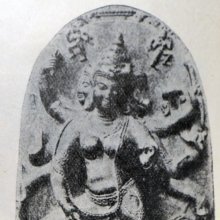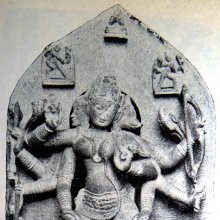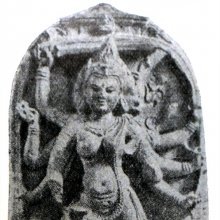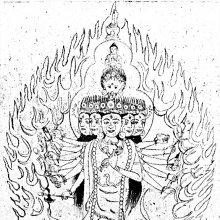Purandara, Puraṃdara, Puramdara: 24 definitions
Introduction:
Purandara means something in Buddhism, Pali, Hinduism, Sanskrit, Jainism, Prakrit, the history of ancient India, Hindi. If you want to know the exact meaning, history, etymology or English translation of this term then check out the descriptions on this page. Add your comment or reference to a book if you want to contribute to this summary article.
Images (photo gallery)
In Hinduism
Purana and Itihasa (epic history)
Source: archive.org: Puranic Encyclopedia1) Purandara (पुरन्दर).—Indra.
2) Purandara (पुरन्दर).—Tapa, son of the agni called Pāñcajanya. Indra once became the son of this Purandara. (Śloka 3, Chapter 221, Vana Parva).
3) Purandara (पुरन्दर).—The name of Indra in Vaivasvata Manvantara. (See under Manvantara). In Matsya Purāṇa Purandara has been considered to be one among the eighteen Vāstuśāstrakāras (adepts in house building). The other seventeen are: Bhṛgu, Atri, Vasiṣṭha, Viśvakarmā, Maya, Nārada, Nagnajit, Viśālākṣa, Brahmā, Kumāra, Nandīśa, Śaunaka, Garga, Vāśudeva, Śukra, Bṛhaspati and Aniruddha. (Matsya Purāṇa, Chapter 252, verses 2 and 3).
According to Mahābhārata Lord Śiva wrote a book "Vaiśālākṣa" containing ten thousand chapters dealing with Dharmārthakāmas. Purandara condensed it into a book of five thousand chapters called 'Bāhudantaka.' Purandara gave that book that name in honour of his mother who was called Bāhudantī. (Chapters 59, 89 and 90, Śānti Parva).
Source: Cologne Digital Sanskrit Dictionaries: The Purana Index1a) Purandara (पुरन्दर).—Indra of the Vaivasvata epoch; 1000 eyed.*
- * Bhāgavata-purāṇa VIII. 13. 4; IX. 8. 8; X. 77. 36-7; XII. 8. 15. Brahmāṇḍa-purāṇa II. 36. 205. Vāyu-purāṇa 34. 75; 62. 178; 64. 7; 67. 102. Viṣṇu-purāṇa III. 1. 31 and 43; V. 21. 16.
1b) Indra observed ādityaśayana;1 one of the authors on architecture;2 the abode of.3
Source: Shodhganga: The saurapurana - a critical studyPurandara (पुरन्दर) is the name of Indra in the Vaivasvatamanvantara: one of the fourteen Manvantaras, according to the 10th century Saurapurāṇa: one of the various Upapurāṇas depicting Śaivism.—Accordingly, “The present, the seventh manvantara is Vaivasvata [viz., vaivasvatamanvantara]. In this manvantara, Purandara is the Indra who is the Subduer of the pride of the Asuras; The gods are the Ādityas, the Rudras, the Vasus and the Maruts. The seven seers are Vasiṣṭha, Kaśyapa, Atri, Jamadagni, Gautama, Viśvāmitra and Bharadvāja.”.

The Purana (पुराण, purāṇas) refers to Sanskrit literature preserving ancient India’s vast cultural history, including historical legends, religious ceremonies, various arts and sciences. The eighteen mahapuranas total over 400,000 shlokas (metrical couplets) and date to at least several centuries BCE.
Ayurveda (science of life)
Rasashastra (Alchemy and Herbo-Mineral preparations)
Source: Wisdom Library: Rasa-śāstraPurandara (पुरन्दर) or Purandararasa is the name of an Ayurvedic recipe defined in the fifth volume of the Rasajalanidhi (chapter 3, Kāsaroga: cough-related-diseases). These remedies are classified as Iatrochemistry and form part of the ancient Indian science known as Rasaśāstra (medical alchemy). However, since it is an ayurveda treatment it should be taken with caution and in accordance with rules laid down in the texts.
Accordingly, when using such recipes (e.g., purandara-rasa): “the minerals (uparasa), poisons (viṣa), and other drugs (except herbs), referred to as ingredients of medicines, are to be duly purified and incinerated, as the case may be, in accordance with the processes laid out in the texts.” (see introduction to Iatro chemical medicines)

Āyurveda (आयुर्वेद, ayurveda) is a branch of Indian science dealing with medicine, herbalism, taxology, anatomy, surgery, alchemy and related topics. Traditional practice of Āyurveda in ancient India dates back to at least the first millenium BC. Literature is commonly written in Sanskrit using various poetic metres.
Vastushastra (architecture)
Source: archive.org: Bharatiya vastu-sastraPurandara (पुरन्दर) or Śakra is the name of an ancient teacher (ācārya) of Vāstuśāsta (science of architecture) according to the Matsyapurāṇa.—All these great teachers cannot be said to be legendary. Some used to be propagated in ancient India. No nation can flourish without its care for its material prosperity. All this technique and training and their systematic and successful teaching and transmission were of equal importance. Most of the treatises of Vāstuśāstra carry many of these names [i.e., Purandara], yet a good many of them are quoted as authorities, yet still others are honoured with actual passages being quoted from their works.

Vastushastra (वास्तुशास्त्र, vāstuśāstra) refers to the ancient Indian science (shastra) of architecture (vastu), dealing with topics such architecture, sculpture, town-building, fort building and various other constructions. Vastu also deals with the philosophy of the architectural relation with the cosmic universe.
Jyotisha (astronomy and astrology)
Source: Wisdom Library: Brihat Samhita by VarahamihiraPurandara (पुरन्दर) is another name for Indra, according to the Bṛhatsaṃhitā (chapter 15) (“On the nakṣatras—‘asterisms’”), an encyclopedic Sanskrit work written by Varāhamihira mainly focusing on the science of ancient Indian astronomy astronomy (Jyotiṣa).—Accordingly, “Those who are born on the lunar day of Svātī will delight in keeping birds, deer, horses; will be grain merchants; dealers in beans; of weak friendship; weak, of abstemious habits and skilled tradesmen. Those who are born on the lunar day of Viśākhā will grow trees yielding red flowers and red fruits; be dealers in gingelly seeds, beans, cotton, black gram and chick peas and worshippers of Indra and Agni (purandara-hutāśa-bhakta). [...]”.

Jyotisha (ज्योतिष, jyotiṣa or jyotish) refers to ‘astronomy’ or “Vedic astrology” and represents the fifth of the six Vedangas (additional sciences to be studied along with the Vedas). Jyotisha concerns itself with the study and prediction of the movements of celestial bodies, in order to calculate the auspicious time for rituals and ceremonies.
In Buddhism
Mahayana (major branch of Buddhism)
Source: Wisdom Library: LokottaravādaPurandara (पुरन्दर) is the name of a Buddha under whom Śākyamuni (or Gautama, ‘the historical Buddha’) acquired merit along the first through nine bhūmis, according to the Mahāvastu. There are in total ten bhūmis representing the ten stages of the Bodhisattva’s path towards enlightenment. He is also known by the name Puraṃdara (पुरंदर).
Purandara is but one among the 500 Buddhas enumerated in the Mahāvastu during a conversation between Mahākātyāyana and Mahākāśyapa, both principle disciples of Gautama Buddha. The Mahāvastu is an important text of the Lokottaravāda school of buddhism, dating from the 2nd century BCE.

Mahayana (महायान, mahāyāna) is a major branch of Buddhism focusing on the path of a Bodhisattva (spiritual aspirants/ enlightened beings). Extant literature is vast and primarely composed in the Sanskrit language. There are many sūtras of which some of the earliest are the various Prajñāpāramitā sūtras.
In Jainism
General definition (in Jainism)
Source: archive.org: TrisastisalakapurusacaritraPurandara (पुरन्दर) refers to one of the two sons of Himacūlā and king Vijaya, according to the Jain Ramayana and chapter 7.4 [Rāma and Lakṣmaṇa] of Hemacandra’s 11th century Triṣaṣṭiśalākāpuruṣacaritra: an ancient Sanskrit epic poem narrating the history and legends of sixty-three illustrious persons in Jainism.—Accordingly, “Now since the time of the kingdom of Ṛṣabha Svāmin in the city Ayodhyā there had been innumerable kings in the solar race in the Ikṣvāku-line, of whom some had attained emancipation and some had gone to heaven. In the expanding congregation of the twentieth Arhat, there were a king Vijaya and his wife, Himacūlā; and they had two sons, Vajrabāhu and Purandara”.
Source: The University of Sydney: A study of the Twelve ReflectionsPuraṃdara (पुरंदर) refers to “Indra”, according to the 11th century Jñānārṇava, a treatise on Jain Yoga in roughly 2200 Sanskrit verses composed by Śubhacandra.—Accordingly, “The rain clouds, wind, sun, moon, earth, ocean and Indra (puraṃdara)—those, which are protected by the doctrine, are of service to the whole world. I think, that doctrine, whose progress is unimpeded, has arisen for the benefit of the world of living souls in the guise of world-protectors”.
Synonyms: Indra.
Source: academia.edu: Tessitori Collection IPurandara (पुरन्दर) is the name of a businessman, according to the Puṇyasāracaupaī by Puṇyakīrti dealing with the lives of Jain teachers.—The Puṇyasāra-caupaī (in Gujarati) is included in the collection of manuscripts at the ‘Vincenzo Joppi’ library, collected by Luigi Pio Tessitori during his visit to Rajasthan between 1914 and 1919.—Accordingly, “Puṇyasāra was the son of the businessman Purandara and his wife Puṇyaśrī. In his youth he was addicted to game. He easily married seven daughters of a merchant, but had difficulty gaining his eighth wife, a girl he had known in childhood who persistently refused him. [...]”.

Jainism is an Indian religion of Dharma whose doctrine revolves around harmlessness (ahimsa) towards every living being. The two major branches (Digambara and Svetambara) of Jainism stimulate self-control (or, shramana, ‘self-reliance’) and spiritual development through a path of peace for the soul to progess to the ultimate goal.
India history and geography
Source: archive.org: Personal and geographical names in the Gupta inscriptionsPuraṃdara (पुरंदर) is an example of a name based on Indra mentioned in the Gupta inscriptions. The Gupta empire (r. 3rd-century CE), founded by Śrī Gupta, covered much of ancient India and embraced the Dharmic religions such as Hinduism, Buddhism and Jainism. Derivation of personal names (e.g., Puraṃdara) during the rule of the Guptas followed patterns such as tribes, places, rivers and mountains.

The history of India traces the identification of countries, villages, towns and other regions of India, as well as mythology, zoology, royal dynasties, rulers, tribes, local festivities and traditions and regional languages. Ancient India enjoyed religious freedom and encourages the path of Dharma, a concept common to Buddhism, Hinduism, and Jainism.
Languages of India and abroad
Sanskrit dictionary
Source: DDSA: The practical Sanskrit-English dictionaryPuraṃdara (पुरंदर).—[puraḥ śatrūṇāṃ nagarāṇi dārayati khac]
1) Name of Indra; पुरन्दरश्रीः पुरमुत्पताकं प्रविश्य पौरैरभिनन्द्यमानः (purandaraśrīḥ puramutpatākaṃ praviśya paurairabhinandyamānaḥ) R.2.74.
2) An epithet of Śiva.
3) Of Agni.
4) Name of Viṣṇu.
5) Name of the eighteenth lunar mansion (jyeṣṭhā).
6) A thief, house-breaker.
-rā An epithet of the Ganges.
Derivable forms: puraṃdaraḥ (पुरंदरः).
Source: Cologne Digital Sanskrit Dictionaries: Edgerton Buddhist Hybrid Sanskrit DictionaryPuraṃdara (पुरंदर).—name of a former Buddha: Mahāvastu i.137.6 (v.l. °dhara).
Source: Cologne Digital Sanskrit Dictionaries: Shabda-Sagara Sanskrit-English DictionaryPurandara (पुरन्दर).—m.
(-raḥ) 1. A name of Indra. 2. An epithet of Siva. 3. An epithet of Agni. 4. A thief, a house-breaker. n.
(-raṃ) A sort of pepper, (Piper chavya.) f.
(-rā) A name of the Ganges. E. pura a city, dṝ to tear or rend, aff. svac, deriv. irr.
Source: Cologne Digital Sanskrit Dictionaries: Benfey Sanskrit-English DictionaryPuraṃdara (पुरंदर).—i. e. pura + m -dṛ10 + a, m. Destroyer of castles, a name of Indra.
Source: Cologne Digital Sanskrit Dictionaries: Cappeller Sanskrit-English DictionaryPuraṃdara (पुरंदर).—[masculine] [Epithet] of [several] gods (lit. destroyer of castles).
Source: Cologne Digital Sanskrit Dictionaries: Monier-Williams Sanskrit-English Dictionary1) Puraṃdara (पुरंदर):—[=puraṃ-dara] [from puraṃ > pur] m. ‘destroyer of strongholds’, Name of Indra, [Ṛg-veda] etc. etc. (also of the I° of the 7th Manv-antara, [Purāṇa])
2) [v.s. ...] of Agni, [Ṛg-veda]
3) [v.s. ...] of Śiva, [Śivagītā, ascribed to the padma-purāṇa]
4) [v.s. ...] a thief, house-breaker, [cf. Lexicographers, esp. such as amarasiṃha, halāyudha, hemacandra, etc.]
5) [v.s. ...] of a man, [Siṃhāsana-dvātriṃśikā or vikramāditya-caritra, jaina recension]
6) Puraṃdarā (पुरंदरा):—[=puraṃ-darā] [from puraṃ-dara > puraṃ > pur] f. Name of Gaṅgā or another river, [cf. Lexicographers, esp. such as amarasiṃha, halāyudha, hemacandra, etc.]
7) Puraṃdara (पुरंदर):—[=puraṃ-dara] [from puraṃ > pur] n. Piper Chaba, [cf. Lexicographers, esp. such as amarasiṃha, halāyudha, hemacandra, etc.]
Source: Cologne Digital Sanskrit Dictionaries: Yates Sanskrit-English DictionaryPurandara (पुरन्दर):—[pura-ndara] (raḥ) 1. m. Indra; a thief. f. (rā) Ganges. (raṃ) n. Pepper.
Source: DDSA: Paia-sadda-mahannavo; a comprehensive Prakrit Hindi dictionary (S)Purandara (पुरन्दर) in the Sanskrit language is related to the Prakrit word: Puraṃdara.
[Sanskrit to German]
Sanskrit, also spelled संस्कृतम् (saṃskṛtam), is an ancient language of India commonly seen as the grandmother of the Indo-European language family (even English!). Closely allied with Prakrit and Pali, Sanskrit is more exhaustive in both grammar and terms and has the most extensive collection of literature in the world, greatly surpassing its sister-languages Greek and Latin.
Hindi dictionary
Source: DDSA: A practical Hindi-English dictionaryPuraṃdara (पुरंदर) [Also spelled purandar]:—(nm) one of the numerous names of [iṃdra]—the chief of gods.
...
Prakrit-English dictionary
Source: DDSA: Paia-sadda-mahannavo; a comprehensive Prakrit Hindi dictionaryPuraṃdara (पुरंदर) in the Prakrit language is related to the Sanskrit word: Purandara.
Prakrit is an ancient language closely associated with both Pali and Sanskrit. Jain literature is often composed in this language or sub-dialects, such as the Agamas and their commentaries which are written in Ardhamagadhi and Maharashtri Prakrit. The earliest extant texts can be dated to as early as the 4th century BCE although core portions might be older.
Kannada-English dictionary
Source: Alar: Kannada-English corpusPuraṃdara (ಪುರಂದರ):—
1) [noun] Indra, the chief of gods, who destroyed enemies' cities.
2) [noun] Śiva, who destroyed the three aerial cities built by three daemons.
Kannada is a Dravidian language (as opposed to the Indo-European language family) mainly spoken in the southwestern region of India.
See also (Relevant definitions)
Starts with: Puramdaracapa, Puramdarapura, Purandarabhakta, Purandararasa, Purandarayashas, PurantaraM.
Ends with: Mahipurandara.
Full-text (+80): Pauramdara, Puramdarapuri, Bhumipuramdara, Puramda, Puramdaracapa, Puramdarapuratithi, Puramdaraharit, Puramdarakshmadhara, Puramdarapura, Purindada, Purabhid, Puramathana, Puramathitri, Apabhaya, Bahudanti, Ravindra, Shacipuramdara, Surala, Dashapuramdara, Dari.
Relevant text
Search found 56 books and stories containing Purandara, Puraṃ-dara, Puram-dara, Puraṃ-darā, Puraṃdara, Puraṃdarā, Puramdara; (plurals include: Purandaras, daras, darās, Puraṃdaras, Puraṃdarās, Puramdaras). You can also click to the full overview containing English textual excerpts. Below are direct links for the most relevant articles:
Rig Veda (translation and commentary) (by H. H. Wilson)
Brihad Bhagavatamrita (commentary) (by Śrī Śrīmad Bhaktivedānta Nārāyana Gosvāmī Mahārāja)
Verse 1.1.70-72 < [Chapter 1 - Bhauma (the earthly plane)]
Verse 2.2.26 < [Chapter 2 - Jñāna (knowledge)]
Verse 1.2.22 < [Chapter 2 - Divya (the celestial plane)]
Garga Samhita (English) (by Danavir Goswami)
Verse 1.7.35 < [Chapter 7 - Description of the Conquest of All Directions]
Verse 3.2.24 < [Chapter 2 - The Great Festival of Śrī Girirāja]
Verse 3.4.7 < [Chapter 4 - The Coronation-Bathing of Śrī Kṛṣṇa]
Shat-cakra-nirupana (the six bodily centres) (by Arthur Avalon)
Verse 14 < [Section 2]
Trishashti Shalaka Purusha Caritra (by Helen M. Johnson)
Part 18: The Bhavanapatis < [Chapter III - The initiation and omniscience of Ajita]
Part 4: Birth ceremonies of Ṛṣabha < [Chapter II]
Part 2: Rāma’s lineage (introduction) < [Chapter IV - The, birth, marriage, and retreat to the forest of Rāma and Lakṣmaṇa]
Kashyapa Shilpa-shastra (study) (by K. Vidyuta)
2 (a). Literary Evidence to Art-Activity < [Chapter 1 - Introduction]



